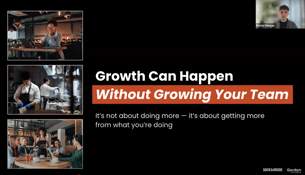After working for years as a restaurant manager and chef, Chris Richardson found himself wanting to start a business of his own. At the time, he didn’t quite have the money to open a brick and mortar. But he saw the food truck scene around him in Portland booming. So he went for it, entering the world with a burger truck called Smak Dabs in January of 2015.
“I was in a pod with a bunch of other food trucks – it was definitely a struggle at first,” says Richardson.
Within a couple of years, however, Richardson left the pod and took his truck mobile. It was a transformational move, and one he largely pays credit to Liz Werner, owner of Suburban Events, for helping him make.
“I had always thought doing mobile stuff would be such a pain, but it’s way more lucrative, and Liz does all of the legwork – the cold calls to find events, the marketing, scheduling, and usually accurate forecasting [of attendance],” says Richardson.
Werner essentially acts as a food truck broker, although she prefers to call her business an “event management company”, one that specializes in creating and managing food truck popups. Currently, Werner works with around 30 food truck owners, filling their schedules with bookings at events and properties like commercial business parks, primarily within Portland.
“Every quarter, she sends me a huge list of options, and I either say ‘yes’ or ‘no’, and she adds them to my Google calendar,” says Richardson of his relationship with Werner. “It saves tons of time – I know where I’m going to go, how many people I’m going to serve, and that just eliminates waste all around.”
While still a relatively newly emerging profession, food truck brokers are now in many of the major cities where food trucks roam. There are also technology platforms popping up, like Goodfynd, which connects food trucks to businesses in the Washington-D.C.-Maryland-Virginia area, and Truckster, operating out of Denver and Portland.
Werner, who’s currently expanding her business to the East Coast, says the best way to find a broker is usually through word of mouth. If a broker hasn’t already reached out to you, consider asking fellow operators for recommendations.
Every broker operates a little differently. But to get a better idea of what a typical relationship looks like, we chatted with Werner about what truck owners can expect.
What is a food truck broker?
Food truck brokers secure bookings for food truck operators in exchange for commission. They also work with event organizers, essentially acting as the middleman to schedule the right trucks for different events or locations.
“Event organizers could be a wedding planner, or someone looking for a food truck for a corporate holiday party, or the property manager of a lucrative property, like a commercial business park or residential community,” says Werner.
When working with property managers, Werner becomes in charge of establishing ongoing food truck rotations. This typically includes scheduling different food trucks for each day of the week and creating marketing materials to make sure tenants know which truck will be onsite and the menu in advance.
Trucks already partnered with Werner get first dibs for each rotation and are chosen based on prerequisites they’ve shared. These include their general availability, radius willing to travel, and dollar sales minimum expected per booking.
“The trucks tell me their parameters, and then any time an event comes into my inbox or I seek out an event, they’re already in the pot,” says Werner. “I already know what minimums they accept and days of the week they’re available, so they know the emails coming from me are qualified leads.”
Werner also shares estimated attendance numbers in advance, which are based off of past sales averages or occupancy numbers at a scheduled location.
“Rather than having to have a long back and forth conversation with the event organizer, all of the details come in a streamlined calendar invite, with the address, time, and how many people they’ll need to prep for,” explains Werner.
How much does it cost to work with a food truck broker?
As with Richardson, most truck operators who opt to work with a broker say it’s a major timesaver – but at what cost?
Brokers typically work on commission, meaning you pay only when they secure you a booking. Werner charges 10% on the first $500 in sales, and then 8% on any sales beyond $500 – equal to $90 on the first $1,000 earned. Commission rates vary by broker so it’s worth shopping around to get an idea of rates in your area.
“I would say if I’m paying more than 10% commission, that’s too much,” says Becca Russell, a Portland-based food truck operator who works with several booking agents to secure bookings.
Russel adds, “We've come to see the fee as a necessary business expense in exchange for sales we wouldn't otherwise have. It's no different to us than paying an entry fee or other commission at bigger events, like concerts and street markets. In essence, we get the same thing in return – a captive audience for a well-marketed event.”
A good broker will vet sites in advance and provide estimates of how much you can expect to earn. For one-off events, like a birthday party, brokers often work out a minimum guarantee with event organizers. If the numbers don’t feel worth your time, or an event doesn’t feel like the right fit, you always have the option to decline.
“I have one very popular truck where I can basically only give them weddings and a couple high performing locations – I probably book 1[%] to 5% of their events at the moment,” says Werner. “Other trucks, I’ll book 50% of their business, and some I’ll book 100%.”
Are bookings guaranteed?
How often you work with a broker may come down to what kind of following you’ve already built. There’s little benefit in sharing your sales with an external partner if you’ve already established a schedule filled with busy locations. But if you’re newer to the scene, the right broker can help get you into events or properties that cater to hundreds, and sometimes thousands, of people. Often they’re doing marketing that’ll get your name out there, too.
“The properties I work with have a minimum of 500 to 1,500 people who filter in throughout the week, and the trucks we work with are marketed to all of those people,” says Werner. “Your brand’s being put in front of 500 people today, 600 people tomorrow, 800 people the next day, and that’s opposed to just parking in one spot and only having access to the people who drive by or frequent the nearby businesses.”
While bookings aren’t guaranteed, brokers can generally provide a good idea of how many monthly bookings they can offer. This is based on how many event coordinators they’re currently working with and scheduling holes they need to fill. The broker’s job is to marry the needs of truck owners with the needs of locations that want to host trucks. Werner compares the process to doing a “gigantic jigsaw puzzle”. And that’s exactly the headache she’s trying to offload from truck operators.
“I love helping entrepreneurs succeed and this has really been such a good way to do that,” she says.
[Photo courtesy RODNAE Productions]





